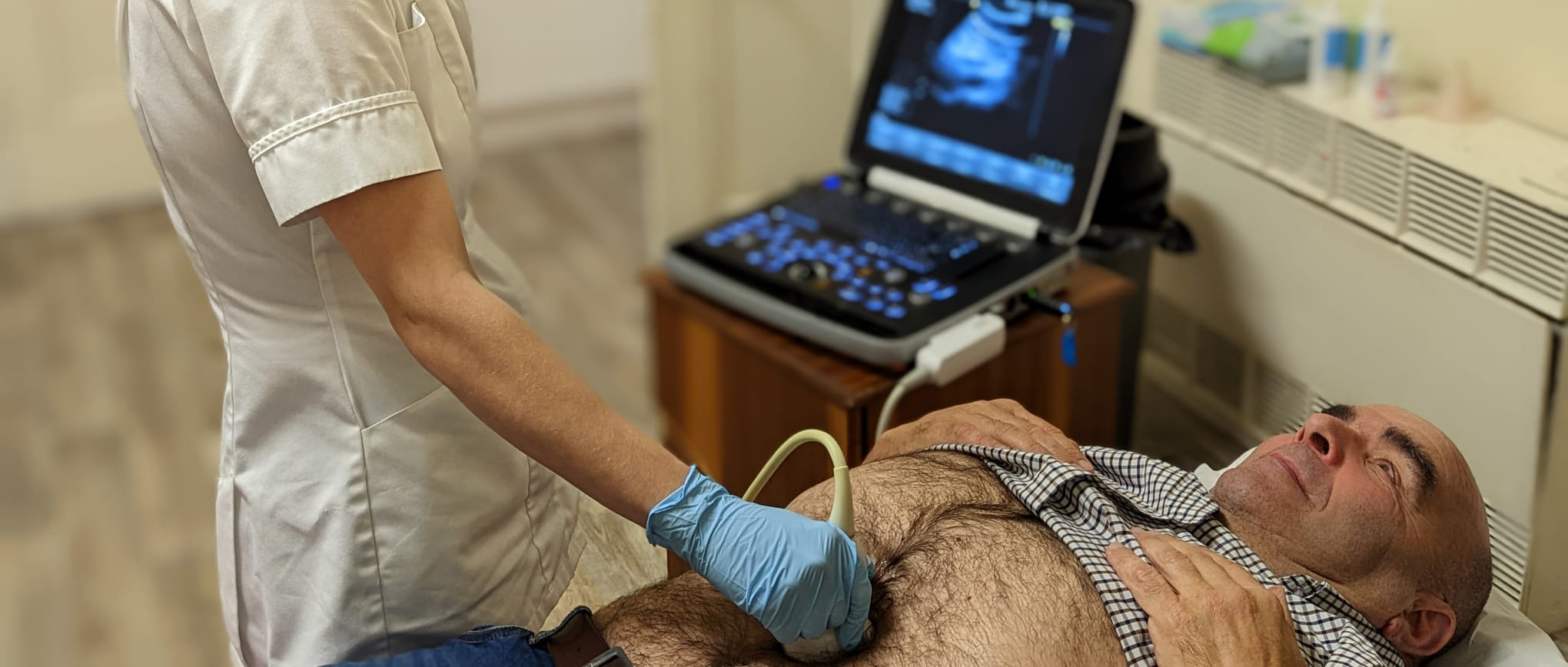- Home
- Our Providers
- Our Services
- Abdominal Aortic Aneurysm Screening
- Alzheimer’s Disease
- Antibiotics Treatment
- Arthritis
- Asthma and Allergies
- Blood Work
- Breast Cancer Screening
- Cancer Screenings
- Cervical Cancer Screening
- CHF
- Chronic Diseases Management
- Colon Cancer Screening
- Physical Exam and Preventative Care
- COPD
- Covid Testing
- Dementia
- Depression and Anxiety
- Diabetes Mellitus Type 1 & 2
- Ear Cleaning
- ECG
- Fibromyalgia
- Flu Tests
- GERD
- Heart Disease
- Hepatitis Screening
- High Blood Pressure
- High Cholesterol
- HIV Screen Tests
- Hormone Therapy
- Iron Injection
- Joint Injection
- Kidney Disease
- Lung Cancer Screening
- Medical Wellness Visits
- Men’s Health
- Nutrition Consultation
- Obesity
- Osteoporosis
- Peripheral Neuropathy
- Peripheral Vascular Disease
- Pre and Post Surgical Evaluations
- Prostate Cancer Screening
- Pulmonary Disease
- Pulmonary Function Test
- Seizure
- Sexual Transmitted Diseases
- Sick Visits
- Skin Biopsy
- Sleep Apnea
- Smoking Cessation and Reduction
- Stroke
- Testosterone Injection
- Thyroid Dysfunction
- Ultrasound
- Urine Analysis
- Vaccinations
- Vascular Studies
- Vitamin B12 Replacement
- Weight Loss
- Wound Care and Suture Removal
- Telemedicine
- Join Our Team
- Patients
Abdominal Aortic Aneurysm Screening
At CoreMed Plus, we understand the importance of preventative care and early detection regarding health concerns like Abdominal Aortic Aneurysms (AAA). AAA is a severe condition that can be life-threatening if left untreated, and early detection is critical to successful treatment and recovery.
Our team of healthcare professionals is dedicated to providing high-quality, comprehensive healthcare services to individuals in need, including AAA screenings. We believe that by offering advanced screening technologies and personalized care, we can help our patients detect potential health concerns early on and take proactive steps toward maintaining good health.
At CoreMed Plus, we strive to create a comfortable and compassionate environment for all of our patients, and we work closely with you to assess your individual risk factors for AAA and recommend appropriate screening tests. Our state-of-the-art facilities and advanced screening technologies ensure you receive the highest care possible.
By choosing CoreMed Plus for your AAA screening needs, you are taking a proactive step towards maintaining good health and preventing potentially life-threatening conditions. Contact us today to learn more about our healthcare services and how we can help you stay healthy and protected.

What is an Abdominal Aortic Aneurysm
Abdominal Aortic Aneurysm (AAA) is a severe condition when the aorta, the largest blood vessel in the body, becomes enlarged and weakened in the abdominal area. The aorta carries blood from the heart to the rest of the body, and when it weakens and expands, it can rupture, causing life-threatening bleeding. AAA is potentially fatal, and early detection and treatment are critical for successful outcomes.
Symptoms of AAA may not be noticeable until it becomes a medical emergency. However, some individuals may experience abdominal or back pain or a pulsing sensation in the abdomen. Risk factors for AAA include smoking, high blood pressure, atherosclerosis, and a family history of the condition. Men over 65 are also at a higher risk of developing AAA.
Screening for AAA involves a non-invasive ultrasound examination that measures the size of the abdominal aorta. This screening is recommended for individuals with a higher risk of developing AAA, such as men over 65 who have ever smoked and individuals with a family history of AAA. Early detection and treatment of AAA can help prevent rupture and life-threatening bleeding.
At CoreMed Plus, we offer AAA screening as part of our comprehensive healthcare services. Our healthcare professionals can work with you to assess your risk for AAA and recommend appropriate screening tests. We prioritize early detection and prevention of AAA to help ensure our patients’ best possible health outcomes.
If you are at risk for AAA or have symptoms, seeking medical attention as soon as possible is important. Our team at CoreMed Plus is here to provide personalized care and support for individuals with AAA. Contact us today to learn more about our healthcare services and how we can help you.
Symptoms of Abdominal Aortic Aneurysm
An abdominal Aortic Aneurysm (AAA) is a potentially life-threatening condition often showing no symptoms until it has progressed significantly. However, some individuals may experience the following symptoms:
- Abdominal or Back Pain: This may be a constant or aching pain, and it may be felt in the abdomen, lower back, or sides.
- Abdominal Swelling or Bloating: This may be accompanied by a pulsing sensation in the abdomen.
- Nausea and Vomiting: This may result from pressure on the digestive system caused by the enlarged aorta.
- Low Blood Pressure: In severe cases, AAA can cause a drop in blood pressure, leading to dizziness, fainting, or shock.
It is important to note that other conditions can also cause these symptoms; not everyone with AAA will experience them. In many cases, AAA is detected during routine medical screenings, such as ultrasound or CT scans.
Risk factors for AAA include smoking, high blood pressure, atherosclerosis, and a family history of the condition. Men over 65 are also at a higher risk of developing AAA. If you experience any of the above symptoms or are at risk for AAA, seeking medical attention as soon as possible is essential. Early detection and treatment of AAA can prevent rupture and life-threatening bleeding.
At CoreMed Plus, we offer comprehensive healthcare services, including screening and treatment for AAA. Our team of healthcare professionals can work with you to assess your individual risk factors and recommend appropriate screening tests. Contact us today to learn more about our healthcare services and how we can help you stay healthy.

Treatment for Abdominal Aortic Aneurysm (AAA)
Treatment for Abdominal Aortic Aneurysm (AAA) depends on the size and location of the aneurysm, as well as the overall health of the patient. Small aneurysms may not require immediate treatment, while larger ones may require prompt surgical intervention.
Here are some of the treatment options for AAA:
- Watchful Waiting: This treatment approach is often recommended for small aneurysms less than 5 centimeters in diameter. Watchful waiting aims to closely monitor the aneurysm for signs of growth or changes without immediately resorting to surgery or other invasive procedures. The patient will typically undergo regular imaging tests, such as ultrasound or CT scans, to monitor the aneurysm over time. If the aneurysm shows signs of growth or becomes symptomatic, the doctor may recommend further treatment options.
- Medications: Certain medications, such as beta-blockers or ACE inhibitors, may be prescribed to help lower blood pressure and reduce the risk of aneurysm rupture. High blood pressure is a common risk factor for aneurysm formation and growth, so controlling blood pressure is an essential part of managing AAA. Additionally, statins may be prescribed to help manage high cholesterol levels, which can also contribute to aneurysm formation and growth.
- Endovascular Repair: Endovascular repair is a minimally invasive procedure that involves inserting a stent graft into the aneurysm to reinforce the weakened area of the aorta. The stent graft is typically inserted through a small incision in the groin, and guided to the aneurysm site using imaging technology. Once the stent graft is in place, it helps support the weakened area of the aorta and prevents further expansion of the aneurysm. This procedure can be a less invasive alternative to traditional open surgery, and may be recommended for patients who are not good candidates for open surgery.
- Open Surgery: In some cases, open surgery may be necessary to repair the aneurysm. This involves making an incision in the abdomen and replacing the weakened portion of the aorta with a synthetic graft. Open surgery is typically reserved for larger aneurysms or those causing symptoms, as it is a more invasive procedure than endovascular repair.
- Lifestyle Changes: Besides medical treatment, lifestyle changes such as quitting smoking, maintaining a healthy weight, and managing high blood pressure and cholesterol levels can help reduce the risk of aneurysm growth and rupture. Smoking is a significant risk factor for aneurysm formation and development, so quitting is an essential step in managing AAA. Additionally, maintaining a healthy weight and engaging in regular physical activity can help lower blood pressure and reduce the risk of aneurysm growth. Controlling high blood pressure and cholesterol levels through diet and medication can also help reduce the risk of aneurysm complications.
At CoreMed Plus, our team of healthcare professionals is dedicated to providing personalized care and support to our patients, including those with AAA. We work closely with you to assess your risk factors and recommend appropriate treatment options based on your unique needs and preferences.
Whether you require medication management, minimally invasive endovascular repair, or open surgery, we are here to support you every step of the way. Contact us today to learn more about our healthcare services and how we can help you maintain good health and prevent potentially life-threatening conditions like AAA.
How CoreMed Plus Can Help You With Abdominal Aortic Aneurysm (AAA)
CoreMed Plus offers comprehensive screening and diagnostic services for Abdominal Aortic Aneurysm (AAA) to help detect and manage this potentially life-threatening condition. Our team of experienced healthcare professionals is dedicated to providing personalized care and support to each patient, from initial screening and diagnosis to ongoing treatment and management.
We utilize the latest imaging technology and diagnostic tools to screen for AAA and accurately diagnose the condition in its early stages. Our goal is to identify AAA before it becomes symptomatic or potentially life-threatening so that we can recommend appropriate treatment options to manage the condition and prevent complications.
In addition to screening and diagnosis, we offer a range of treatment options for AAA, including watchful waiting, medication management, endovascular repair, open surgery, and lifestyle changes. Our team will work closely with you to assess your risk factors and recommend the most appropriate treatment options based on your unique needs and preferences.
At CoreMed Plus, we understand the importance of early detection and timely treatment for conditions like AAA. That’s why we are committed to providing compassionate, high-quality care and support to our patients. Whether you require screening, diagnosis, treatment, or ongoing management for AAA, we help you maintain good health and prevent potentially life-threatening complications. Contact us today to learn more about our healthcare services and how we can help you live a healthier, more vibrant life.

Meet Dr. Mark Richter
I grew up in Florida as the oldest of five sons. After earning my degree from the University of Florida, I pursued my medical education in the Dominican Republic. In 1988, I began my Family Practice Residency at the “old” Pontiac General Hospital. I have been providing medical care to the same community since 1991, first in Waterford and later at our current location in White Lake, where I continue to practice today. I take pride in being board certified by the American Academy of Family Physicians and remain committed to Primary Care.
I am passionate about promoting a healthy lifestyle, including a proper “balanced” diet, exercise, exposure to healthy outdoor activities, and achieving work-life balance. I married my Medical School Sweetheart, Barbara, and we are fortunate to have two adult children and a granddaughter. We have been residents of Oakland County since 1988 and enjoy all that Michigan has to offer.
Meet Briahnnon Long NP-BC
Briahnnon Long, NP-BC, graduated from Oakland University in 2009 with a Bachelor of Science in Nursing and worked as a nurse in the Cardiac Intensive Care Unit. She then pursued her Master of Science in Nursing. She graduated from The University of Michigan Flint in 2020 and became board certified by The American Nurses Credentialing Center as a Family Nurse Practitioner.
She works in the acute care setting as a hospitalist and in the subacute care setting at a skilled nursing facility. She has special interests in health and wellness, preventative medicine, and chronic care management in the primary care setting. She loves being outdoors, cheering on her husband and two children in hockey, and camping and boating in the summer.
Contact Information
If you’re ready to take charge of your health and embark on a journey toward a healthier, happier life, we invite you to contact us today. Our compassionate and knowledgeable staff is excited to take your call and help you on your health journey. We will work closely with you to develop a customized treatment plan that is right for you and provide the support and care you need every step of the way.
Don’t let health concerns hold you back – contact CoreMed Plus today and let us help you achieve optimal health and wellness. We look forward to hearing from you and helping you achieve a healthier, happier life.
- Email: [email protected]
- Phone: +1 248-666-6005




